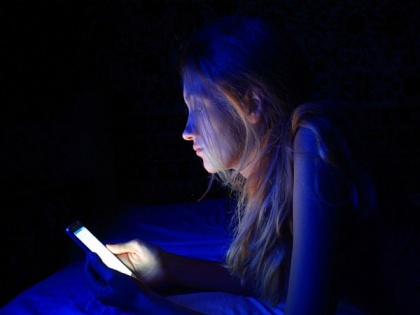Study explores if night mode feature can help you sleep better
By ANI | Published: May 1, 2021 03:55 PM2021-05-01T15:55:02+5:302021-05-01T16:05:02+5:30
A recent study explores how scrolling through your mobile phone and its blue light makes it harder to fall asleep.

Study explores if night mode feature can help you sleep better
A recent study explores how scrolling through your mobile phone and its blue light makes it harder to fall asleep.
It's widely believed that the emitted blue light from phones disrupts melatonin secretion and sleep cycles. To reduce this blue light emission and the strain on the eyes, Apple introduced an iOS feature called Night Shift in 2016; a feature that adjusts the screen's colours to warmer hues after sunset.
Android phones soon followed with a similar option, and now most smartphones have some sort of night-mode function that claims to help users sleep better.
Until recently, claims of better sleep due to Night Shift have been theoretical. However, a new study from Brigham Young University (BYU) published in the journal Sleep Health, challenges the premise made by phone manufacturers and found that the Night Shift functionality does not actually improve sleep.
To test the theory, BYU psychology professor Chad Jensen and researchers from the Cincinnati Children's Hospital Medical Center compared the sleep outcomes of individuals in three categories: those who used their phone at night with the Night Shift function turned on, those who used their phone at night without Night Shift and those who did not use a smartphone before bed at all.
"In the whole sample, there were no differences across the three groups," Jensen said. "Night Shift is not superior to using your phone without Night Shift or even using no phone at all."
The study included 167 emerging adults ages 18 to 24 who use cell phones daily. They were asked to spend at least eight hours in bed and wore an accelerometer on their wrist to record their sleep activity. Individuals who were assigned to use their smartphone also had an app installed to monitor their phone use.
The measured sleep outcomes included total sleep duration, sleep quality, wake after sleep onset and the time it took to fall asleep.
After not finding significant differences in sleep outcomes across the three categories, the researchers split the sample into two separate groups: one which averaged about seven hours of sleep and another that slept less than six hours each night.
The group that got seven hours of sleep, which is closer to the recommended eight to nine hours a night, saw a slight difference in sleep quality based on phone usage. The individuals who did not use a phone before bed experienced superior sleep quality relative to both those with normal phone use and those using Night Shift.
Within the six-hour group, which had the least amount of sleep, there were no differences in sleep outcomes based on whether the participants used Night Shift or not.
"This suggests that when you are super tired you fall asleep no matter what you did just before bed," explained Jensen. "The sleep pressure is so high there is really no effect of what happens before bedtime."
The results suggest that it is not blue light alone that creates difficulty falling or staying asleep. The psychological engagement experienced when texting, scrolling and posting are also important factors that affect sleep outcomes.
"While there is a lot of evidence suggesting that blue light increases alertness and makes it more difficult to fall asleep, it is important to think about what portion of that stimulation is light emission versus other cognitive and psychological stimulations," said Jensen.
Night Shift may make your screen darker, but Night Shift alone will not help you fall or stay asleep.
( With inputs from ANI )
Disclaimer: This post has been auto-published from an agency feed without any modifications to the text and has not been reviewed by an editor
Open in app